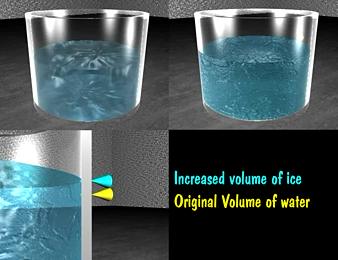The chemical or physical alteration of rock by water, air, or organic matter. Weathering is the process by which rock is converted to regolith. (The irregular blanket of lose material cover the earth.)
Physical weathering is the breaking down of rock by physical means, there is no chemical change, rather there is size reduction while maintaining the same original chemistry.
Chemical weathering, is the reaction of the mineral material and its conversion from one composition to another. The rocks most susceptible to chemical weathering are those that were farthest from the conditions present on the earths surface. (What does that mean? - Rocks formed at high temperature and under high pressure are more susceptible to chemical weathering than rocks formed near or at the surface.)
Physical Weathering .. causes of:
1.) Water (freeze thaw cycle)
2.) Salt growth
3.) Fire
4.) Plant Growth
Water has a rather unique property, when it freezes to a solid it increases in volume rather than decreases. Ice takes up about 9% more volume than the same amount of liquid water.
It's a cyclic process, water enters a crack or joint, freezes and causes the joint to expand. More water can enter the expanded joint, freezing again, and causing further joint expansion.
Enough expansion in a joint will cause the rock to crack, and this is the main process for creating rock debris on higher mountains.

| NEXT | TOC | PREV |